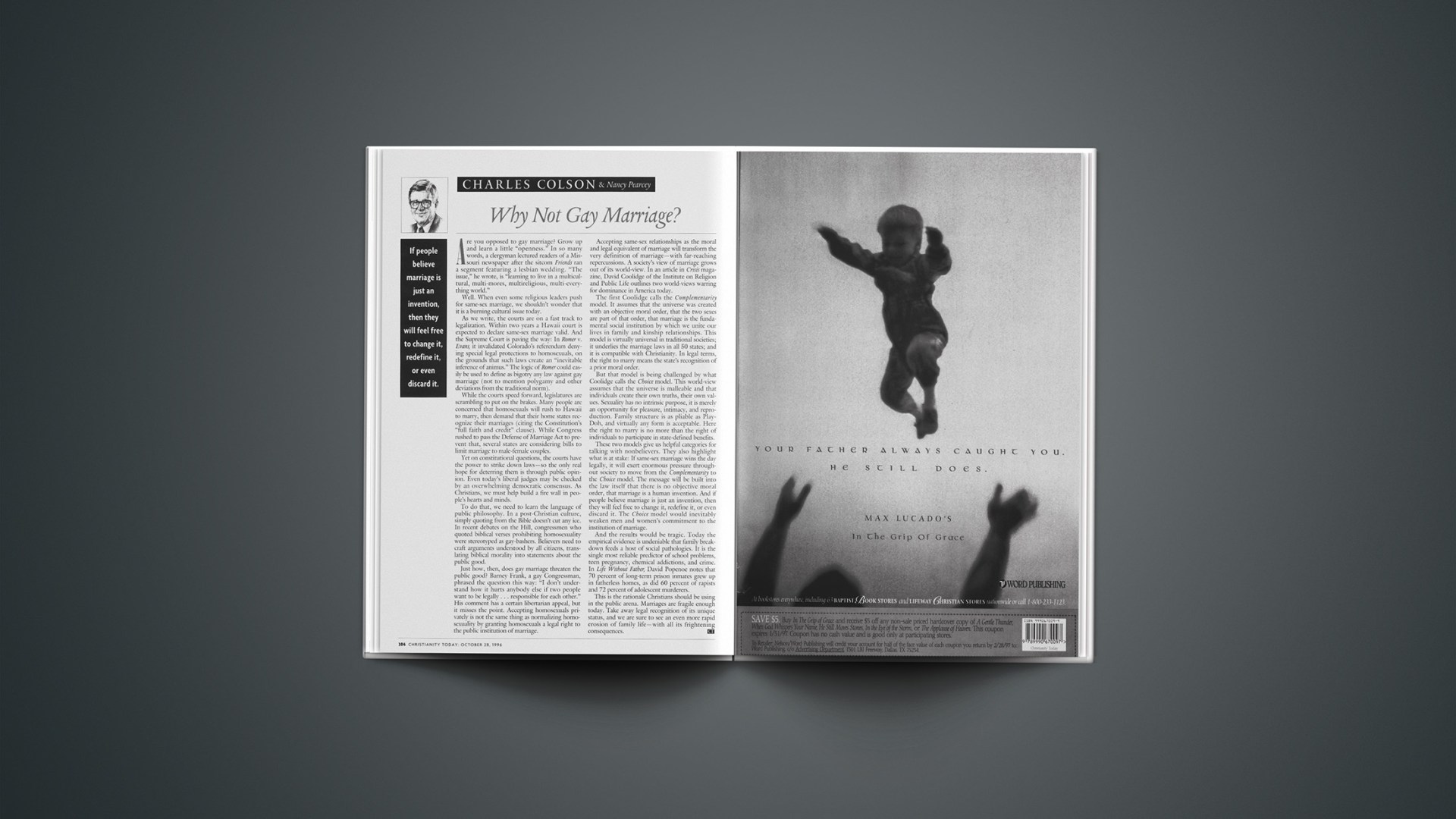Are you opposed to gay marriage? Grow up and learn a little “openness.” In so many words, a clergyman lectured readers of a Missouri newspaper after the sitcom Friends ran a segment featuring a lesbian wedding. “The issue,” he wrote, is “learning to live in a multicultural, multi-mores, multireligious, multi-everything world.”
Well. When even some religious leaders push for same-sex marriage, we shouldn’t wonder that it is a burning cultural issue today.
As we write, the courts are on a fast track to legalization. Within two years a Hawaii court is expected to declare same-sex marriage valid. And the Supreme Court is paving the way: In Romer v. Evans, it invalidated Colorado’s referendum denying special legal protections to homosexuals, on the grounds that such laws create an “inevitable inference of animus.” The logic of Romer could easily be used to define as bigotry any law against gay marriage (not to mention polygamy and other deviations from the traditional norm).
While the courts speed forward, legislatures are scrambling to put on the brakes. Many people are concerned that homosexuals will rush to Hawaii to marry, then demand that their home states recognize their marriages (citing the Constitution’s “full faith and credit” clause). While Congress rushed to pass the Defense of Marriage Act to prevent that, several states are considering bills to limit marriage to male-female couples.
Yet on constitutional questions, the courts have the power to strike down laws—so the only real hope for deterring them is through public opinion. Even today’s liberal judges may be checked by an overwhelming democratic consensus. As Christians, we must help build a fire wall in people’s hearts and minds.
To do that, we need to learn the language of public philosophy. In a post-Christian culture, simply quoting from the Bible doesn’t cut any ice. In recent debates on the Hill, congressmen who quoted biblical verses prohibiting homosexuality were stereotyped as gay-bashers. Believers need to craft arguments understood by all citizens, translating biblical morality into statements about the public good.
Just how, then, does gay marriage threaten the public good? Barney Frank, a gay Congressman, phrased the question this way: “I don’t understand how it hurts anybody else if two people want to be legally … responsible for each other.” His comment has a certain libertarian appeal, but it misses the point. Accepting homosexuals privately is not the same thing as normalizing homosexuality by granting homosexuals a legal right to the public institution of marriage.
Accepting same-sex relationships as the moral and legal equivalent of marriage will transform the very definition of marriage—with far-reaching repercussions. A society’s view of marriage grows out of its world-view. In an article in Crisis magazine, David Coolidge of the Institute on Religion and Public Life outlines two world-views warring for dominance in America today.
The first Coolidge calls the Complementarity model. It assumes that the universe was created with an objective moral order, that the two sexes are part of that order, that marriage is the fundamental social institution by which we unite our lives in family and kinship relationships. This model is virtually universal in traditional societies; it underlies the marriage laws in all 50 states; and it is compatible with Christianity. In legal terms, the right to marry means the state’s recognition of a prior moral order.
But that model is being challenged by what Coolidge calls the Choice model. This world-view assumes that the universe is malleable and that individuals create their own truths, their own values. Sexuality has no intrinsic purpose, it is merely an opportunity for pleasure, intimacy, and reproduction. Family structure is as pliable as Play-Doh, and virtually any form is acceptable. Here the right to marry is no more than the right of individuals to participate in state-defined benefits.
These two models give us helpful categories for talking with nonbelievers. They also highlight what is at stake: If same-sex marriage wins the day legally, it will exert enormous pressure throughout society to move from the Complementarity to the Choice model. The message will be built into the law itself that there is no objective moral order, that marriage is a human invention. And if people believe marriage is just an invention, then they will feel free to change it, redefine it, or even discard it. The Choice model would inevitably weaken men and women’s commitment to the institution of marriage.
And the results would be tragic. Today the empirical evidence is undeniable that family breakdown feeds a host of social pathologies. It is the single most reliable predictor of school problems, teen pregnancy, chemical addictions, and crime. In Life Without Father, David Popenoe notes that 70 percent of long-term prison inmates grew up in fatherless homes, as did 60 percent of rapists and 72 percent of adolescent murderers.
This is the rationale Christians should be using in the public arena. Marriages are fragile enough today. Take away legal recognition of its unique status, and we are sure to see an even more rapid erosion of family life—with all its frightening consequences.
Copyright © 1996 Christianity Today. Click for reprint information.
Last Updated: October 10, 1996










